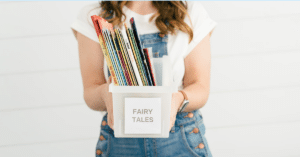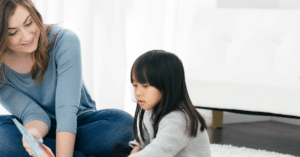Listen on Apple Podcasts Listen on Spotify
How Mindfulness Can Help You Be a Better SLP
When you hear “mindfulness”, what do you think of? 💭
Maybe you think about yoga or meditation or breathwork — and you’d be right! But mindfulness is also so much more than that, which is why Marisha and Dr. Laura Mansfield are discussing the power of mindfulness for SLPs on this episode of The Joyful SLP.
Did you miss the first few episodes of this series? You can get caught up in a jiff! We’ve covered self-care, self-reflection, emotions, and gratitude so far.
In this episode, Marisha and Laura chat about their personal experiences and the benefits of mindfulness for SLPs. They cover different ways to practice mindfulness, like guided meditation, yoga, and mindful breathing. They also talk about the benefits of practicing mindfulness — like how it can help with stress, anxiety, focus, attention, and relationships.
Marisha and Laura emphasize the importance of taking care of yourself, make suggestions for incorporating mindfulness into your everyday life (even if you feel like you don’t have any time!) and they encourage you to try different practices to find what works for you.
If you’re feeling overwhelmed, distracted, or just want to connect with yourself a little more, this episode is perfect for you!
“Sometimes we can get into that routine of just letting our thoughts drive things without actually backing up and deciding what you’re going to think about. Sometimes we let our minds run away as opposed to giving that space to be like, ‘Is that really how I wanna think about this?’” — Dr. Laura Mansfield
Resources + Links Mentioned
🧘🏻♀️ Headspace
🧘🏻♀️ Insight Timer
🧘🏻♀️ Marisha’s Journal
🧘🏻♀️ Breathwork resources
🧘🏻♀️ Mastry
Episode Summary
In the episode, Marisha and Laura talk about:
What people think mindfulness is — and what it actually is. One of the things both Marisha and Laura have struggled with is this idea that mindfulness has to look a certain way, or that you’re doing it “wrong” if you aren’t able to completely empty your mind. Then, they discuss how they’ve come to understand mindfulness, and how they make it happen in their lives today.
How yoga and breathwork can support SLPs. Whether you love a sweaty hot session or prefer something more akin to intermittent napping (like Marisha!) there are so many mindfulness practices and skills that we learn from yoga. Laura shares that the practice of yoga taught her how to take deep cleansing breaths and take in her environment, allowing her to be more present with her students.
What to do if you don’t have time for mindfulness. When you’re already feeling behind on all of the things, the prospect of taking a break (even for two minutes!) can be daunting at best. Marisha and Laura talk about how you can work mindfulness into your busy day just 30 seconds at a time — and how those 30 second breaks will pay out in the long run.
“I think it’s interesting when we think about mindfulness, I think some people think of mindfulness as clearing your mind of everything, and it has to be completely empty… as opposed to just making space.” — Dr. Laura Mansfield
Excerpts from the Episode
Marisha: “I learned all of the research. I had some really great experiences in the classroom, and I really enjoyed it, but I could not get into a consistent implementation of that setting. I had a really hard time generalizing it and I was also like, ‘Oh, mindfulness isn’t for me. It’s for other people.’ It was just really interesting navigating that and now it’s like a huge part of my self-care.”
Marisha: “In the beginning, if I were to like sit down and set a timer for five minutes and like, ‘Okay, Marisha, meditate now’ I would not have had any success. I think the guided meditations are really helpful, especially as a starting point because they kind of walk you through it.”
Laura: “It’s interesting when we think about mindfulness, I think some people think of mindfulness as clearing your mind of everything, and it has to be completely empty. And that’s what mindfulness is. And they think, if I don’t do it right, why am I gonna do it? Like I know I can be that way. Like, ‘Oh, if I can’t do it right, then I’m not gonna do it at all.’”
Laura: “Capturing those thoughts and thinking about things a different way, which is something we can do. So if we aren’t being mindful, we can just let those negative thought patterns go. And also staying present and engaged in the current moment, which, when we talk about gratitude and self-reflection and things like that, it’s very hard to find moments where you’re grateful for something if you’re stuck in these negative thought patterns.”
Marisha: “I try to have just quiet time. Like if I go for a walk, I don’t put in my earbuds. Sometimes I will wanna listen to music or I wanna listen to a podcast while I walk, but usually walks are my quiet time. Instead of getting so much in my own head I’ll notice what I see and what I smell and just take in what I am seeing versus getting stuck in my head.”
Laura: “And when I’m with kids in session, and if my kids are around and I find my mind going to the next 20 things on my list or what I have to do tomorrow and the week after that, I’ll just say, ‘You know what, Laura, right here, right now is the only place you need to be.’ And just the practice of yoga allows me to take that deep cleansing breath in that moment, really take in my environment.”
Marisha: “If I’m feeling overwhelmed, it’s incredible how much just doing some box breathing or using whatever breathing technique can really help with regulating things.”
Laura: “Mindfulness can happen in all kinds of moments. I’ve tried to, I don’t know if you have an Apple watch like I do, but there’s like a hand washing timer on it and it’s 30 seconds, and I know like healthy hand washing is like 20 seconds technically, but it’s amazing how long 30 seconds can feel and even allowing myself time to smell the soap. Feel the warm water on my hands and be mindful in that moment when we’re often rushing from session to session and don’t give ourselves time to go to the bathroom.”
Marisha: “And if you are a minute or two late to picking up a student, but you are taken care of, I feel like though that minute of missed therapy, how much more present you’ll feel and you’ll be able to show up as a better SLP. And so yeah, you might have 28 minutes instead of 30 minutes with a student, but the quality of those 28 minutes could be that much better.”
Laura: “When you invest that little bit of time in yourself, your own self care, you know, really taking the time to reduce that stress and anxiety… you just show up better for yourself, for your relationships, for your students, and they’ll feel it.”
Subscribe
Listen to The SLP Now Podcast on Apple ★ Spotify ★ Google ★ Stitcher ★ Castbox or wherever you listen to podcasts.
Transcript
05 Mindfulness
[00:00:00] Laura: Hey, Marisha.
[00:00:01] Marisha: Hey, Laura.
[00:00:01] Laura: So when I say mindfulness, what do you think of?
[00:00:05] Marisha: I've had an interesting journey with mindfulness, and I know a lot of you listening will maybe be in the same boat that I was in. I majored in psychology as an undergrad and I had the opportunity to take a seminar on mindfulness with one of the top researchers in the field, which was really cool.
And so I learned all of the research. I had some really great experiences in the classroom, and I really enjoyed it, but I could not get into a consistent implementation of it. I feel like outside of that setting, I had a really hard time generalizing it and I was also like, "Oh, mindfulness isn't for me. It's for other people." It was just really interesting navigating that and now it's like a huge part of my self-care. It's been really interesting seeing that journey.
[00:00:55] Laura: Yeah, that is interesting. What do you think got in your way of, you [00:01:00] know, classroom versus self?
Was it just like your brain was just going or?
[00:01:04] Marisha: Yeah, my brain just moves a mile a minute. Yeah. There's always chatter going on in there.
And yeah.
[00:01:11] Laura: I think it's interesting when we think about mindfulness, I think some people think of mindfulness as clearing your mind of everything, and it has to be completely empty.
And that's what mindfulness is.
[00:01:22] Marisha: Yeah.
[00:01:22] Laura: And they think, if I don't do it right, why am I gonna do it? Like I know I can be that way. Like, "Oh, if I can't do it right, then I'm not gonna do it at all."
[00:01:32] Marisha: Mm-hmm.
[00:01:32] Laura: As opposed to just making space. Right?
[00:01:36] Marisha: Mm-hmm.
[00:01:36] Laura: Being aware of what's going on inside of you and giving it space without judgment.
[00:01:42] Marisha: Yeah.
[00:01:42] Laura: And that curiosity that we've talked about for mindfulness, just being aware of what's going on and accepting it.
[00:01:48] Marisha: Mm-hmm.
[00:01:49] Laura: Instead of being frustrated by it or upset that we reacted that way, or, you know, just wanting to push it away and not deal with it. Yeah, mindfulness, I think just gives you like that [00:02:00] space.
So you mentioned research that you learned about in your seminar, and there is a ton of research around mindfulness and how powerful it is for managing stress anxiety. It helps us improve our focus and our attention. It enhances our relationships with others. It helps us with that self-reflection and self-awareness.
It helps us reduce negative thought patterns. Cause sometimes we can get into that routine of just letting our thoughts drive things without actually backing up. And you can decide what you're going to think about. And sometimes we let our minds run away as opposed to giving that space to be like, "Is that really how I wanna think about this?"
[00:02:44] Marisha: Mm-hmm.
[00:02:45] Laura: Capturing those thoughts and thinking about things a different way, which is something we can do. So if we aren't being mindful, we can just let those negative thought patterns go. And also staying present and engaged in the current moment, which, when we talk about [00:03:00] gratitude and self-reflection and things like that, it's very hard to find moments where you're grateful for something if you're stuck in these negative thought patterns.
Or you're thinking about the next thing you have to do instead of being present in the moment. So mindfulness really helps that as well. So now that we've talked about some of the things that it can do for you in terms of your physical health and your emotional health and your focus and attention, what can we do to improve our mindfulness?
I know you said you've been on a journey. Have you found anything that's helped you improve your ability to stay mindful and have a practice of mindfulness?
[00:03:35] Marisha: I've tried different meditation apps and I've used a handful over the years and they've been helpful in different seasons.
Headspace is one.
[00:03:45] Laura: Mm-hmm.
[00:03:46] Marisha: Insight Timer is another one.
Do you have any other favorite ones?
[00:03:50] Laura: I've done Headspace. I like that a lot.
And spiritual practices are really big for me.
[00:03:56] Marisha: Mm-hmm.
[00:03:57] Laura: So I have my own spiritual practices of [00:04:00] devotionals and journals and things that I do to help me stay mindful and check in.
[00:04:03] Marisha: Mm-hmm.
[00:04:04] Laura: With how I'm doing. So I find that really helpful. And, you know, regardless of people's spiritual beliefs and backgrounds, mindfulness is embedded in so many different spiritual pursuits. So it's definitely something I think that people, depending on where they're at, can find little inroads to in their belief system.
[00:04:22] Marisha: Yeah. And I think that the apps that I mentioned have guided meditations and so that helps. Especially in the beginning, if I were to like sit down and set a timer for five minutes and like, "Okay, Marisha, meditate now" I would not have had any success. I think the guided meditations are really helpful, especially as a starting point because they kind of walk you through it.
And for me, I try to have just quiet time. Like if I go for a walk, I don't put in my earbuds. Sometimes I will wanna listen to music or I wanna listen to a podcast while I walk, but usually walks are my quiet time.
Instead of getting [00:05:00] so much in my own head I'll notice what I see and what I smell and just take in what I am seeing versus getting stuck in my head.
[00:05:10] Laura: Did you know that mindful walking is actually a research-based practice?
[00:05:13] Marisha: Yeah, I've read about that a little bit.
[00:05:15] Laura: Yeah, it's really cool and paying attention to what's going on in your body and your environment can help you be more present and focused, so that's definitely a good strategy.
How do you feel about yoga? Have you ever done yoga?
[00:05:26] Marisha: I have. I love the yoga where you're not really moving.
[00:05:31] Laura: Mm. Is it hatha yoga?
[00:05:33] Marisha: It's usually restorative yoga.
[00:05:35] Laura: Okay.
[00:05:35] Marisha: So you hold poses a little bit.
[00:05:37] Laura: Like the corpse pose for 15 minutes where you're just laying on the ground.
[00:05:41] Marisha: Yeah.
So that is my favorite part at the end of yoga classes where you just get to lay down very few minutes. But the restorative yoga is like bedtime yoga. It's usually later at night.
[00:05:54] Laura: Yeah.
[00:05:54] Marisha: I don't slow down probably as much as I as much would [00:06:00] benefit me.
I was gonna say as much as I should, but I feel like I could probably benefit from a little bit more slowing down and those classes have just helped me kinda slow down a little bit.
[00:06:10] Laura: Yeah. I love yoga. I love the intention of breathing with movement.
[00:06:15] Marisha: Mm-hmm. Mm-hmm.
[00:06:16] Laura: And I love the messages that they give you in yoga. Like I had a yoga instructor, I loved her. And she would say, "Right here, right now is the only place you need to be."
[00:06:26] Marisha: Yeah.
[00:06:26] Laura: And I will repeat that to myself at times at work.
[00:06:29] Marisha: Mm-hmm.
[00:06:29] Laura: And when I'm with kids in session, and if my kids are around and I find my mind going to the next 20 things on my list or what I have to do tomorrow and the week after that, I'll just say, "You know what, Laura, right here, right now is the only place you need to be."
[00:06:44] Marisha: Mm-hmm.
[00:06:44] Laura: And just the practice of yoga allows me to take that deep cleansing breath in that moment, really take in my environment. And I love the movement and I love to stretch and you know, all those kind of the yoga flows.
I really like that. So it's definitely a way that you can [00:07:00] practice mindfulness in yoga and then bring that into your daily life.
[00:07:05] Marisha: Yeah.
[00:07:06] Laura: How about mindful breathing? I mean, that's part of yoga.
[00:07:09] Marisha: Mm-hmm.
[00:07:09] Laura: As SLPs we kind of have an extra little benefit of, we know how the breathing system works.
We know how the diaphragm pushes out the belly and how to fill the belly. And we, you know, a lot of times we'll teach our students, if they have voice issues or other kinds of issues, how their vocal mechanisms work.
[00:07:27] Marisha: Mm-hmm.
[00:07:28] Laura: So we kind of have an inside track on the breathing.
[00:07:30] Marisha: We do.
[00:07:30] Laura: Yeah.
[00:07:31] Marisha: So the journal that I use for my morning practice, and I'll include a link in the show notes too, but they have little breathing exercise suggestions. So that's something that, in the morning, I try to do that.
But it's incredible. If I'm feeling overwhelmed, it's incredible how much just doing some box breathing or using whatever breathing technique can [00:08:00] really help.
[00:08:00] Laura: Yeah.
[00:08:01] Marisha: With regulating things.
If you're not familiar, so box breathing is where you breathe in.
[00:08:07] Laura: Breathe in for four. Hold for four. Out for four.
[00:08:09] Marisha: Yeah. And then hold for four, then breathe in. Hold, breathe out, hold. And yeah, that's really calming.
[00:08:16] Laura: It is very calming. And it's amazing the research around how little we take deep breaths, right? And how we usually use that shallow breathing. And this isn't really related to mindfulness, but I have tried breath work, which is a deeper investigation into breathing and how breathing can help connect you.
[00:08:34] Marisha: Mm-hmm.
[00:08:35] Laura: You know, to the body. So we can maybe put some resources in the show notes if people wanna explore breath work on their own. It can be a way to help you connect to breath.
[00:08:43] Marisha: Mm-hmm.
[00:08:43] Laura: In a powerful way and connect you to your body.
[00:08:45] Marisha: Yeah. I actually just did a really powerful breath work exercise. The woman who facilitated that actually made a breath work app called Mastry. So we can add that in the show notes too.
[00:08:58] Laura: That'd be great. And when we talk about [00:09:00] resources too, a lot of this mindfulness practice, you don't even need an app. You can just Google, you know, go on YouTube
[00:09:06] Marisha: Yeah.
[00:09:06] Laura: And search for a mindful minute or some breath work or yoga, and you'll find so many free resources. If it's something that you wanna try.
[00:09:14] Marisha: Okay.
[00:09:15] Laura: And you know, Mindfulness can happen in all kinds of moments. I've tried to, I don't know if you have an Apple watch like I do, but there's like a hand washing timer on it and it's 30 seconds, and I know like healthy hand washing is like 20 seconds technically, but it's amazing how long 30 seconds can feel and even allowing myself time to smell the soap. Feel the warm water on my hands and be mindful in that moment when we're often rushing from session to session and don't give ourselves time to go to the bathroom.
[00:09:48] Marisha: Mm-hmm. Mm-hmm.
[00:09:48] Laura: Can be a mindful 30 seconds for me that I'm trying to like, just remind myself when I wash my hands to take a deep breath, to be in the moment, to enjoy the feeling of the [00:10:00] warmth of the water and the soap, and take that time.
[00:10:02] Marisha: What would you say to the SLPs who are listening to this, and they're thinking, "Well, I don't have time to add 30 seconds to my bathroom break, or my days are so busy, like how do I do that?"
What would you say?
[00:10:16] Laura: Yeah, I would say a lot of the things that we talk about is an offering, you know, and if you're happy with where you're at and you're content and you don't feel stressed and overwhelmed and anxious and you don't feel like you need it, then we are just offering an opportunity for you to think maybe a little bit differently.
And 30 seconds isn't a lot of time. And so to try it next time you wash your hands, to take the time to slow down, to take a deep breath and see how you feel.
[00:10:45] Marisha: Mm-hmm.
[00:10:46] Laura: And if it's not for you, it's okay, you know? But just an offering of something to consider and you can stick with how you're doing it, if that's what you wanna do.
Yeah. That's okay too.
[00:10:56] Marisha: And if you are a minute or [00:11:00] two late to picking up a student, but you are taken care of.
[00:11:05] Laura: Mm.
[00:11:05] Marisha: I feel like though that minute of missed therapy, how much more present you'll feel and you'll be able to show up as a better
[00:11:14] Laura: yes.
[00:11:14] Marisha: SLP. And so yeah, you might have 28 minutes instead of 30 minutes with a student, but the quality of those 28 minutes could be that much better.
[00:11:24] Laura: Absolutely. It's almost like, you know how they say love multiplies?
[00:11:28] Marisha: Mm-hmm.
[00:11:28] Laura: Right? It doesn't divide, it's not subtractive. As you learn to love and then you love someone else, it multiplies. And I feel like this is the same kind of thing, you know, it's not like a subtraction kind of equation where you're taking away. You're actually investing in, and that multiplies out dividends. You know, when you invest that little bit of time in yourself, your own self care, you know, really taking the time to reduce that stress and anxiety. And you're right, you just show up better for yourself, for your relationships, for your students, and they'll feel it, [00:12:00] right?
And then you'll have hopefully a day that you can find more of those joy moments and feel more joy in your day because you did take that 30 seconds.
[00:12:07] Marisha: Yeah.
[00:12:08] Laura: Yeah.
[00:12:09] Marisha: Yeah. I love that.
[00:12:10] Laura: Yeah. So let us know how you do with your mindful practice if you have one. If there's things you're finding helpful, please share it with us and let us know how it's going.
Yeah, I'd love to hear.
Sign up to receive email updates
Enter your name and email address below and I'll send you periodic updates about the podcast.




Reader Interactions